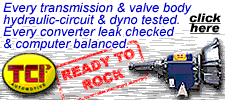|
|
 |
|
|
 |
|
||
|
Hey PRO MOD WAD, I was wondering if you could shed some light on a subject that I'm trying to understand about nitrous motor tuning. I'm concerned about understanding carburetor jetting vs nitrous system jetting. Also how to read the plugs to determine which system affects the plugs in what areas. I have been told that the carburetors have nothing to do with tuning once the first stage of nitrous comes in and so on with the second and third. I have been on a Pro Modified crew for about 3 years now and due to some shake ups in the race team I have more responsibility to cover. I've been involved in drag racing for over 30 years as a driver and a crew member in all types of classes. Also if you could let me know the standard ratio used in NOS/gas jetting on all stages of the nitrous systems or if the ratio is the same for all. The problem we are having right now is no matter what fuel tuning we change right now we do not see a change in MPH performance. Also we normally run between 5 to 5 1/4 PSI of fuel pressure (mostly around 5 PSI). Your insight to this information would greatly be appreciated. Thanks for your help,
Don, Let me start off by making a suggestion to you. Go to www.koehlerinjection.com and check out the Nitrous Wizard he has available. The Wizard is loaded with very valuable info that can help you greatly in solving many of your tuning questions. As far as your question on carburetor vs nitrous jetting, most of the Pro Mods that I know of are kind of stingy in the carb jetting department. The reason is that as the engine sees more nitrous and fuel, the manifold fills with those mixtures plus the standoff of the mixtures being pushed back into the manifold due to cam overlap and higher engine rpm. In this situation the carb air/fuel flow signals slow down tremendously and can cause a richer fuel condition in the engine at higher rpm and just when your bottle pressures are falling off. I do not know exact numbers of carb jets, but they are usually in the mid 80's and can be staggered in all four corners of the carb. I have also been told that in some multi-stage systems that fuel pressure can be as little as four pounds in one or more of the stages. You mention that no matter what you do as far as fuel tuning that you do not see a mph change. This could be caused by several things such as final gear ratios, or way off in the clutch can or transmission gear ratios. These are things to look at very closely. Your clutch manufacturer may be a big help here. As far as reading plugs, when your tune-up is close the plugs will have a slightly grayish look on the porcelain and show a slight amount of heat discoloring and blistering on the ground strap and maybe on the first thread or two on the base of the plug. You should see no speckling or aluminum transfer down in that area of the plug. The timing retard is super important in these types of race engines so by reading plugs you can get great info on your tune up. I hope some of this makes sense to you and good luck into your next season. Wady Hamam |
|||
 Copyright 1999-2002, Drag Racing Online and Racing Net Source |
|||







